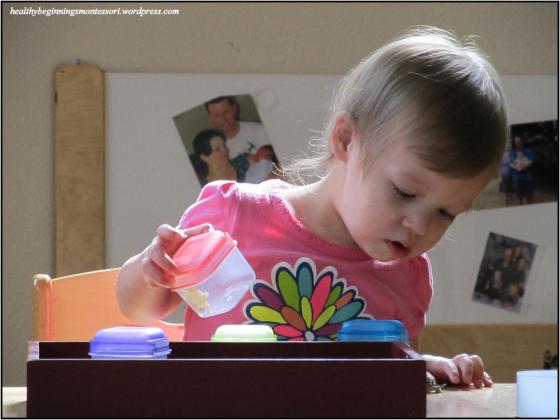The Montessori pedagogy is one that has been practiced for over 100 years. It’s teachings and materials are used to help mold young minds in Montessori schools all over the world. Dr. Maria Montessori developed this philosophy to focus on human development, which is something we embrace here at HBMH.
Many new Montessori parents come to us with the same question, “Will my child be prepared for the 21st Century?” Often times, this is asked while making the decision to remain in Montessori for the kindergarten year, or enroll in public school early. This, of course, is a logical question because Montessori is a more non-traditional practice, however it is one that prepares children to be more academically advanced than their fellow classmates who may have attended a traditional day care/school instead. I enjoy indulging in conversations such as these, because it’s a time to educate my families on the benefits of Montessori; a time to show them all the wonderful gifts and skills their children develop while receiving an authentic Montessori experience every day.
There are so many developmental skills that are embodied in the Montessori curriculum with which our young friends receive every day.
- Critical Thinking and Problem Solving Skills
- Collaboration and Leading by Influence
- Initiative and Entrepreneurialism
- Oral and Written Communication
- Assessing and Analyze Information
- Curiosity and Imagination
- Love of Work
Critical Thinking and Problem Solving

“We need every worker to be a ‘knowledge worker’. How do you do things that haven’t been done before, where you have to rethink or think anew, or break set in a fundamental way, it’s not incremental improvement.” – Hellen Kumata, Managing Partner at Cambria Association
“Our children are allowed to choose, explore, manipulate objects. They are encouraged to formulate ideas, try these ideas out, and accept or reject what they learn.” – Tami Kinna, Owner/Director HBMH
Collaboration and Leading by Influence

“My greatest concern is young people’s lack of leadership skills. Kids just out of school have an amazing lack of preparedness in general leadership skills and collaboration skills. They lack the ability to influence versus direct command.” – Mike Summers, VP of Global Talent Management at Dell Computers
“Classroom communities encompass a two-or three-year age span, which allows younger students to experience the daily stimulation of older role models, who in turn blossom in the responsibilities of leadership. Students not only learn with each other, but from each other.” – Tami Kinna, Owner/Director HBMH
Initiative and Entrepreneurialism

“Leadership is the capacity to take initiative and trust yourself to be creative. I say to my employees if you try five things and get all five of them right, you may be failing.” – Mark Chandler, Senior VP and General Counsel at Cisco
“We encourage curiosity, creativity and self-directed development. The prepared environment creates innovation competence by means of including trained adults and the correct works and resources. The classroom is organized to support experimentation and learning rather than dictating what will be learnt and what the experiment will be.” – Tami Kinna, Owner/Director HBMH
Oral and Written Communication

“We are routinely surprised at the difficulty some young people have in communicating: verbal skills, written skills, presentation skills. They have difficulty being clear and concise; it’s hard for them to create focus, energy and passion around the points they want to make.” – Mike summers, VP for Global Talent Management at Dell Computers
“Our students are encouraged to think for themselves and articulate their own opinions. Socially, they care about others, know how to work well in groups; take a long-term project and break it down into “do-able” parts, and they see assessments as feedback.” – Tami Kinna, Owner/Director HBMH
Assessing and Analyzing Information

“There is so much information available that it is almost too much, and if people aren’t prepared to process the information effectively it almost freezes them in their steps.” – Mike Summers
“Montessori children are encouraged to observe, explore, question, and investigate everything. They are allotted the freedom and time for the conception of a problem or situation and the discovery of its solution. This gives them the opportunity to produce ideas through flexibility which allows for the ability to switch from one perspective to another.” – Tami Kinna, Owner/Director HBMH
Curiosity and Imagination

“I want people who can think – they’re not just bright – they’re also inquisitive. Are they engaged, are they interested in the world.” – Clay Parker, President of the Chemical Management Division of BOC Edwards
“Children can compare, find similarities, and refine the powers of discrimination in order to create abstractions. They learn to distinguish similarities and differences, and learn to place these variables into a n ordered progression. We foster an environment that inspires “what if” and curiosity.” – Tami Kinna, Owner/Director HBMH
Love of Work

“Children know when their work is worthy and good. They know when it measures favorable against their inspirations, talents, efforts, values, and abilities. They learn to assess themselves and their ideas honestly.” – Tami Kinna, Owner/Director HBMH
Pictured Above: On this particular day, our Apple Primary Community came together, collaborated, analyzed and assessed. While collecting, and preparing they showed initiative and adaptability. As a team, they had to effectively communicate and solve problems. A couple of the older students quickly assumed a leadership role. It was incredible to observe delegation, resourcefulness and cooperation. What impressed me the most while watching these students was the respect, compassion and consideration for one another.
